- Home
- Roger Zelazny
If at Faust You Don't Succeed Page 7
If at Faust You Don't Succeed Read online
Page 7
"That's not the point," Faust said. "I'm offering you a live lady."
"Hey, wait a minute!" Marguerite said.
Faust said to Charon, "Just one moment. Trust me." He took Marguerite aside and said to her in an urgent whisper, "My dear, you mustn't believe I'm intending any impropriety when I offered you to Charon. That's not my way at all. But I thought that he might like to have dinner with you and perhaps go morris dancing after that. It would be a change of routine for him and harmless enough for you."
"What made you think I wanted a change of routine?" Charon asked. He had been listening in.
"Men, both alive and dead, desire a change of routine," Faust said. "It is the essence of being."
"Well, I could probably do with a little something different at that. I could use—What is that newfangled word for it?"
"A vacation," Faust said.
"Yeah, a vacation. We didn't have those in the ancient world."
"You have to get used to newfangled notions," Faust said. "It's the essence of keeping up an appearance in this universe. Why don't you set this boat for Constantinople, 1210, and have a nice dinner and dance with Marguerite on the way?"
"And what would you be doing?" Charon said.
"I'll just pop into your cabin and catch up on some back sleep," Faust said. "It's been a busy day."
CONSTANTINOPLE
CHAPTER 1
Mephistopheles seemed to have transported them to a wooded cove. Looking around, Mack saw that large trees grew thereabouts, and they were not trees he knew from Europe. Not even the grass underfoot was familiar, but seemed coarser and more robust than the stuff that greened the byways of home. More he could not tell, for large, drooping willows blocked the view, though he believed, from a certain saltiness in the air, that they were near the sea.
He said to Mephistopheles, "I need to sit down and work on my wish list. You did say you'd grant my wishes, did you not?"
"Yes, of course," Mephistopheles said. "But that's the least of it."
The least of it? For you, maybe, but not for me!
Could I get a little something in advance? What I'd like right away is an ermine-lined cloak, of the sort kings wear, and a silver cup out of which to drink my wine. That pewter stuff is not fit for someone in the high position I have fallen into."
"Pull yourself together," Mephistopheles said sternly. "Forget about the rewards. They will come in due course. For now, your work in this contest is to begin."
"Oh, dear," said Mack. "I'm really not feeling on top of my form. How about a day off first, and then we'll get serious?"
"We are serious now," Mephistopheles said. "You are renowned among men for your great intellect and powers of self-control. I took the occasion to read your dossier while you were carousing among the witches."
"My dossier?"
"In the Record Halls of Darkness there are dossiers on everyone living."
"I didn't know that."
"You were a swot at school, mastering the various disciplines of the lower form with a perseverance that some of your teachers found almost divine."
Mack gaped at him, for he had been an indifferent scholar during his brief years of education. Then he realized that Mephistopheles was talking about the real Faust, not him.
"Show some of that spirit now," Mephistopheles said, "for your time of testing is upon you."
"Yes, yes," Mack said. "I'll be all right." Despite his words, self-doubt seeped through his mind like an ink-leaking squid thrown into a crystalline pond. My God, what was he doing here? It had seemed the veriest madcap of a prank, to deceive this dark and splendid spirit into thinking he was the learned Dr.
Faust. But now he was stuck with the consequences of his action. No longer could he be Mack, the bright but not brilliant student at the monastery school, the unruly and fun-loving lad who had spent but a year among the learned priests, learning the rudiments of scrivening, reading, and reckoning, studying little, getting by on charm and his glib tongue, until, due to a madcap adventure involving several young ladies from the nearby convent and a hogshead of potent German brew, he had found himself turned out to make his way in an inclement world. That was who he was, but who he could no longer be. The chance had been given him to become one of the great ones, to take his place among the famous archetypes, the intellectual movers and shakers of the world. It was also a chance to prove that he was as good a man as Faust, and what he lacked in learning could be put right by asking questions and applying quick-wittedness.
He felt a modest infusion of self-confidence. This was no time to think about his rewards. Mack forced his aching head to attend to present matters. "Where are we?" he asked. "On the shore outside Constantinople," said Mephistopheles, "close to the Frankish encampment. This is where I will leave you. Are you ready for your instructions?"
"That I am," Mack said, trying to put a good face on it but wishing that he had a cup of wine to buck him up. "What do you want me to do?"
"You have three choices," Mephistopheles said. "We require you to pick one."
"And what are these choices?"
"One, to kill Henry Dandolo. Two, to kidnap Alexius the Pretender. Three, to rescue the sacred icon of St. Basil."
Mack thought it was unfair, having to face so many choices before breakfast. But he knew he'd get no sympathy from the now stern-faced Mephistopheles, and so he said, "Which of those would you like me to perform?"
"My likes and dislikes have nothing to do with this matter," Mephistopheles said. "You must use your own judgment."
"But on what basis am I to decide?"
"You must come up with your own criteria, for this is an exercise in human judgment and free will."
"Dandolo? Alexius? But I don't know those people!"
"Obviously, you must acquaint yourself with them."
"And to kill a man—that was one of my choices, was it not?"
"It was indeed."
"Well, surely the forces of Good would take exception to that."
"I think I can speak for my friend Archangel Michael," Mephistopheles said, "when I tell you that you give Good too little credit if you think it never recognizes any grounds for killing. Good knows that there are worse things than that. Not that they condone killing in general; nor do we, for that matter, for intelligence and selection are the essence of both Good and Evil. But none of us gets too worked up over it, being immortals as we are, and used to the long view. We know that killing is a matter of very great importance to men, and so we include its possibility in our contest. And I will also tell you this: In killing, the motive is everything, and the ends are to be considered as well as the means." "But how can I know the ends? How can I tell what the killing of this Dandolo will do in terms of future outcomes?"
"You face a problem common to all men. There is never enough evidence to know whether to kill or not.
Yet sometimes it must be done, both from the point of view of Light as well as that of Dark."
"I'll be judged harshly if I make a mistake." "No one will judge you but Ananke, Necessity, the judge of us all. Choose you must. That is the role of a Faust."
"Well, if you say so. Who am I supposed to kill again?"
"Henry Dandolo, the doge of Venice. And only if you decide that that's the best action under the circumstances."
"And the other guy? Alex something?"
"Alexius, Pretender to the throne of Constantinople."
"And the third choice again?"
"To rescue the sacred relic of St. Basil, protector of Constantinople. Really, Faust, you must pull yourself together. You are well known for your tenacious memory." "It works better when I don't have a hangover," Mack said. "Now would you just mind telling me what a Frankish army is doing at Constantinople?"
Mephistopheles raised an interrogative eyebrow. "I thought an educated man like yourself would know all about this mighty event which took place only a few hundred years ago. I am surprised by your ignorance—though I also know this perhaps is but you
r bit of a joke. It is the Fourth Crusade, of course.
But you must discover the situation for yourself, and take your best action."
"Well, I'll try," Mack said.
"You must do more than that," Mephistopheles said. "We have contracted with you to perform certain actions. If you fail to perform them in the time allotted, you will ruin our contest, and win for yourself something rather unpleasant."
"And what would that be?" Mack asked.
"Pain unspeakable in an everlasting pit in the bottomless places of horror where you wilt be killed unspeakably and then brought back to life to be killed again, and again, and again, until we can think up something worse for you. You have twenty-four hours in which to perform your deed. Adieu."
And with that Mephistopheles took to the air and soon vanished into the sky's sunny vastnesses.
CHAPTER 2
Mack stayed for a while in the cove, turning things over in his mind, until at last, deciding he had better get on with it, he began walking. He soon found himself on a vast plain that stretched, yellow and green, as far as the eye could see. A half mile ahead of him were the steep walls of Constantinople. These walls were higher and more massive than any he had seen in Europe. Sentries in brass cuirasses, with horsetail plumes on their bright helmets, marched along the battlements. Below, and a half mile back from the walls, there were hundreds of tents spread around the plain, and a multitude of camp-fires, and great crowds of armed men. There were also many wagons camped a little apart, in a place of their own, with women and children around them. As he came closer, Mack could see that forges had been set up, and smiths were even now hammering out arrowpoints and lance heads. There were other wagons from which provisions were being unloaded, and there were pavilions with brightly colored banners flying from lances set before them. These seemed to be the abodes of the leaders of this great expedition. Mack saw that this place was a veritable traveling city, a place that could pack up and move at any time. He realized that this city must have been moving almost daily since the host had left Frankland.
"What news bring you of the council?" one of them called out.
"What news I bring is not for your ears," Mack said, deciding to take a high hand lest he be undone at the very beginning.
"But is Boniface of Montferrat still at the meeting? That alone would be a sign of progress."
"I can tell you this much," Mack said. "Conditions haven't changed much in the last few hours."
"Then there's still hope of recovering honor out of this thieves' nest," another of the men-at-arms muttered.
Mack walked on. At last he came to a place that looked familiar. It was a wagon with a broad canopy to one side of it, and under that canopy there were chairs and tables, and there were hogsheads piled high, and men were sitting at the tables and drinking and eating. It was a tavern on wheels.
Grateful that he had found a place at last where he could feel at home, Mack entered and found himself a seat.
The tavern keeper appeared, and, taking in the finery in which Mack had been clothed at the Witches'
Kitchen, louted low and said, "What might I bring you, my lord?"
"Your best wine," Mack said, realizing at once that his credit might be very good in this place.
The tavern keeper drew a piggin of wine and returned with it. "I have not seen you before, sir. Might it be that you have only recently joined our great company?"
"It might indeed be," Mack said. "Is that a roast of venison I smell on the back rack?"
"It is. My lord hath a discerning nose. I'll bring you a gobbet of it forthwith. Prithee, sir, what can you tell us of any tidings you bring from your famous master?"
"What master is that?" Mack said, for the fellow's indirection left him grasping for the meaning, if any.
"I simply assumed, sir, that so great a lord as yourself did no doubt serve a greater; for it is written that all things serve another in this world, whether villein to master, ox to farmer, lord to God, and so on through the heavenly ranks where the rule is the same."
"Your loquacity is exceeded only by your perspicacity," Mack said, the wine having bucked him up considerably.
"I am Johann Faust."
"And you have journeyed far to reach us?"
"Aye, passing far," Mack said.
"And tell me, sir, whom do you serve?"
The loungers in the tavern craned forward to catch the answer. But Mack merely smiled and said, "That is not for me to say at this time."
"Couldn't you give us a hint, though?" For a small crowd, indeed, a half multitude, had gathered around while the tavern keeper and Mack were holding their colloquy.
The landlord squinted one eye and said, "I'll bet you're an agent of the Council of Venice, which seeks to instruct and restrain the vainglorious Henry Dandolo, doge of Venice."
Mack shrugged.
"No," cried another, "he's no man of the Venetians, for note you not that look of proud piety on his face and how his hands seek his sleeves as if he were wearing a monk's habit? I'll bet he's a churchman in disguise, come from Innocent the Third, our Pope who organized this holy Crusade and now finds himself thwarted by the machinations of the diabolical Henry Dandolo."
They all stared at Mack, who said, "I wouldn't say yes and I wouldn't say no."
A third man, a soldier, declared, "It is apparent from his firm bearing and laconic replies that he is a soldier. No doubt he represents Philip of Swabia, a fighting man of few words, albeit many deeds that cry to Heaven for avenging. And I'll bet he brings an offer concerning who is to be ruler of Constantinople once the present incumbent, the inconvenient and stubborn Alexius the Third, has been reduced to a blind beggar scuffling for scraps in the dustbins of his once haughty city."
Mack gave no hint as to his political leanings. There was much conversation about whom Mack was representing, for there seemed no doubt that he was there on behalf of someone. The tavern keeper would accept no pay for his food and drink, asking instead that Mack remember him when the council met to regulate the use of strong drink among the Crusaders. And when Mack made to leave, a short, plump, well-dressed young man in clerk's gray introduced himself as Wasyl of Ghent and asked permission to assist Mack in getting quarters, since he had neglected to do so hitherto.
And so they walked together to the bright yellow double tent with the pennons flying in front of it, for this was headquarters of the Quartermaster Corps. There were loungers at the flap, but Wasyl cleared them out of the way with his announcement, "Make way for Johann Faust, a visitor from Frankland, and one who has not as yet announced his party and affiliation."
The quartermaster was impressed, and, asking no questions, assigned Mack to a high-peaked tent a little off to itself, since he had not associated himself with any of the factions. Wasyl, who seemed to have appointed himself servant and general factotum to Mack's certain but unspecified importance, went ahead to make sure that all was ready. When Mack arrived at his new quarters, he saw that a nice table had been laid for him, and there was a cold fowl and a bottle of wine and a half loaf of good wheaten bread. Not scorning a second lunch, for the tavern keeper had been niggardly with his gobbet of venison, Mack tucked in, meanwhile listening to Wasyl prate of the affairs of the day.
"Pope Innocent the Third," Wasyl went on, "is a pure man in his singleminded desire to free Jerusalem from the Saracen. Yet might not even his motives be suspect due to his overweening desire to bring the Greek Christians under the rule of Rome?"
"Interesting point," Mack said, finishing the bread and starting on some candied sweetmeats he found near-by.
Then there is the question of Alexius the Fourth, as he is sometimes called, though as yet he has no kingdom, the son of the deposed Isaac the Second Angelus. They say he has promised to bring Constantinople under the sway of Rome if he becomes king. So he is seemingly allied to the side of piety.
Yet it is true that his principal backing comes from Philip of Swabia, no friend to the Holy See, a violent man with
ambitions as large as his domain is small."
"I see what you mean," Mack said, though he was making little sense out of the dissertation.
"And finally we must consider the position of Villhardoin, leader of the military expedition, a man both feared and respected, respectful of religion but not himself pious. A good man, one might say. Yet Villhardoin is noted for the extreme shallowness of his political opinions and his indifference to commerce. All he cares about is the clash of edged weapons. Is he the man we need to lead us?"
Mack wiped his mouth and looked around for a place in which to take a nap. The indispensable servant had provided a fine cot with comforter and newfangled pillow. Mack got up and walked toward it.
"My lord, I am your man," Wasyl said. "Will you not take me into your confidence, tell me who you favor and from whom you bring a message? I will fight and connive in your interests, lord. Do but tell me what they are."
Mack wished he could say, because he figured he needed people on his side in this contentious place.
But he didn't know at this point what was the stronger party, nor on which side right lay, nor what he should do that would further the progress of mankind and preserve the city of Constantinople.
"Good servant," he said, "all will be vouchsafed to you in good time. Believe me, you will be the first to know where my sympathies lie. For now, go about the camp and see what rumors are extant, and then come back to me in an hour or two."
"I go!" Wasyl said, and left. Mack stretched out and was asleep almost immediately.
CHAPTER 3
Mack awoke with the feeling that there was someone in the tent with him. It had grown dark. He must have slept for hours. Someone had provided a lighted candle in an earthenware bowl. Wasyl, no doubt.

 Seven Tales in Amber
Seven Tales in Amber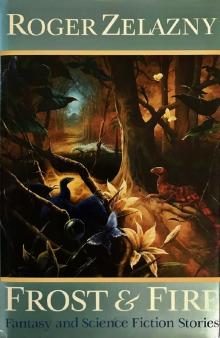 Frost and Fire
Frost and Fire Doorways in the Sand
Doorways in the Sand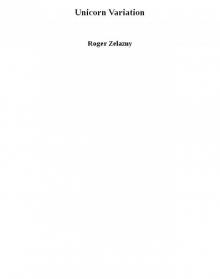 Unicorn Variation
Unicorn Variation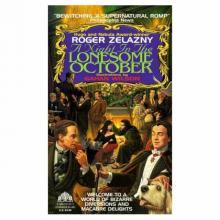 A Night in the Lonesome October
A Night in the Lonesome October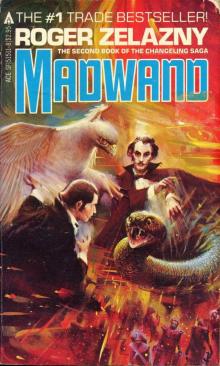 Madwand
Madwand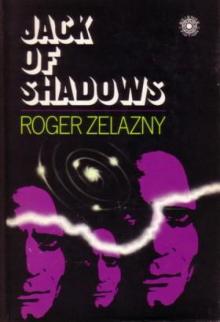 Jack Of Shadows
Jack Of Shadows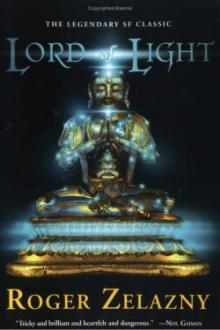 Lord of Light
Lord of Light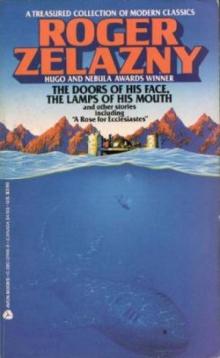 The Doors of His Face, The Lamps of His Mouth and Other Stories
The Doors of His Face, The Lamps of His Mouth and Other Stories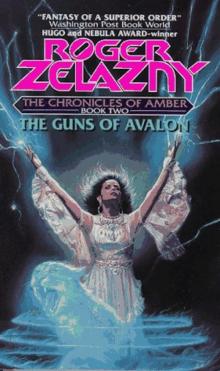 Guns Of Avalon tcoa-2
Guns Of Avalon tcoa-2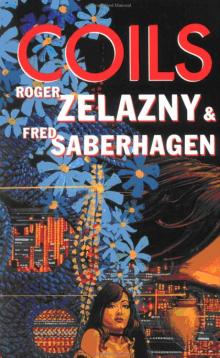 Coils
Coils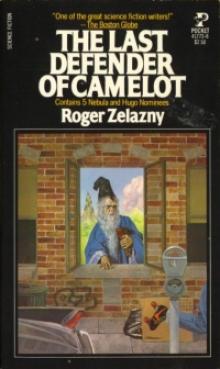 The Last Defender Of Camelot
The Last Defender Of Camelot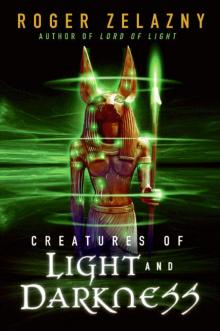 Creatures of Light and Darkness
Creatures of Light and Darkness This Immortal
This Immortal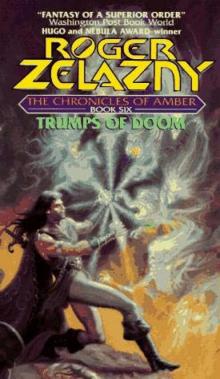 Trumps of doom tcoa-6
Trumps of doom tcoa-6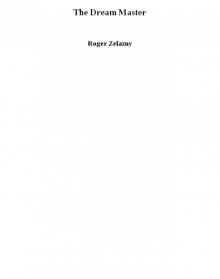 The Dream Master
The Dream Master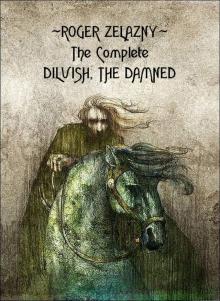 The Complete Dilvish, The Damned
The Complete Dilvish, The Damned Nine Princes in Amber
Nine Princes in Amber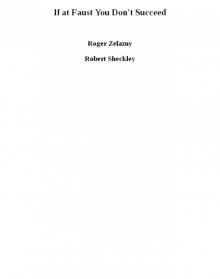 If at Faust You Don't Succeed
If at Faust You Don't Succeed Here there be dragons
Here there be dragons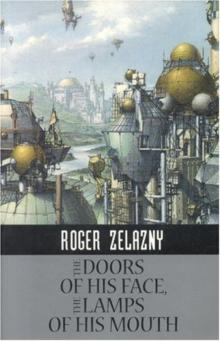 The Doors Of His Face, The Lamps Of His Mouth
The Doors Of His Face, The Lamps Of His Mouth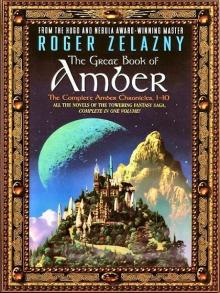 The Great Book of Amber - Chronicles 1-10
The Great Book of Amber - Chronicles 1-10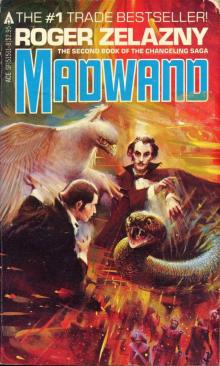 Madwand (Illustrated)
Madwand (Illustrated)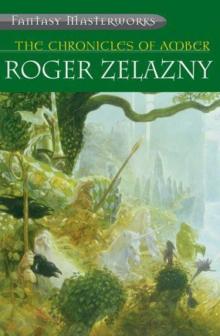 The Chronicles of Amber
The Chronicles of Amber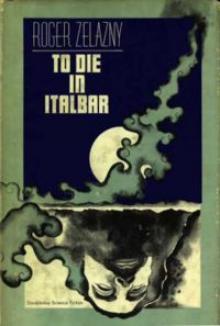 To Die In Italbar
To Die In Italbar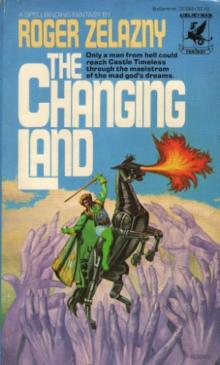 The Changing Land
The Changing Land The Furies
The Furies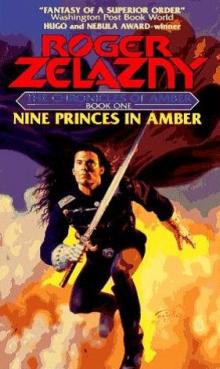 Nine Princes In Amber tcoa-1
Nine Princes In Amber tcoa-1 Last Of The Wild Ones
Last Of The Wild Ones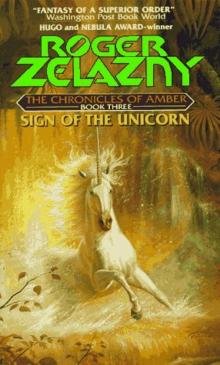 Sign of the Unicorn tcoa-3
Sign of the Unicorn tcoa-3 My Name is Legion
My Name is Legion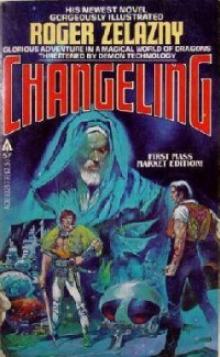 Wizard World 1: Changeling
Wizard World 1: Changeling Changeling
Changeling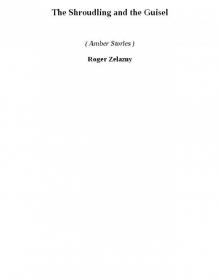 The Shroudling and the Guisel (amber stories)
The Shroudling and the Guisel (amber stories)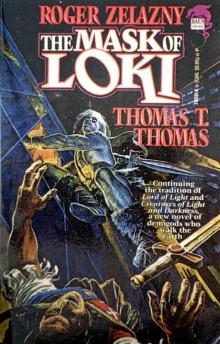 The Mask of Loki
The Mask of Loki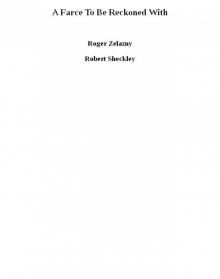 A Farce To Be Reckoned With
A Farce To Be Reckoned With Roadmarks
Roadmarks When Pussywillows Last in the Catyard Bloomed (rtf)
When Pussywillows Last in the Catyard Bloomed (rtf) Hall of Mirrors (amber stories)
Hall of Mirrors (amber stories)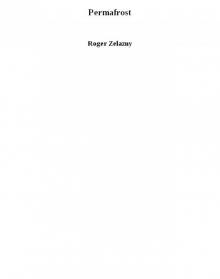 Permafrost
Permafrost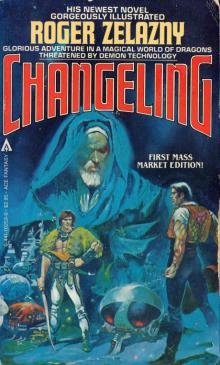 Changeling (Illustrated)
Changeling (Illustrated)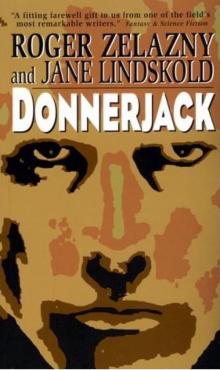 Donnerjack
Donnerjack Shadows & Reflections: A Roger Zelazny Tribute Anthology
Shadows & Reflections: A Roger Zelazny Tribute Anthology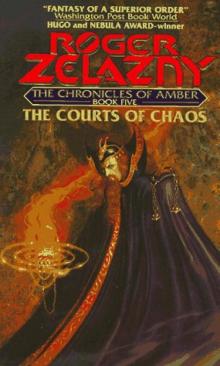 The Courts Of Chaos tcoa-5
The Courts Of Chaos tcoa-5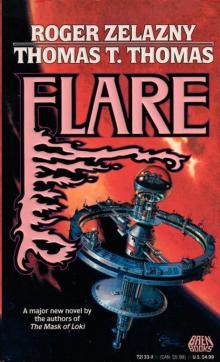 Flare
Flare Doorsways in the Sand
Doorsways in the Sand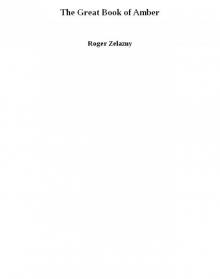 The Great Book of Amber
The Great Book of Amber Home Is the Hangman
Home Is the Hangman For a Breath I Tarry
For a Breath I Tarry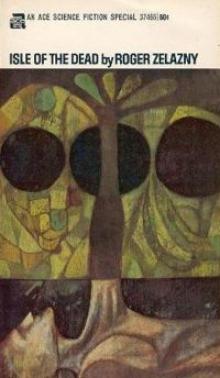 Isle Of The Dead
Isle Of The Dead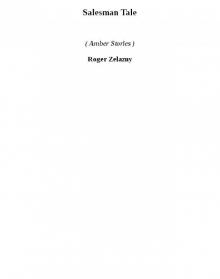 Salesman Tale (amber stories)
Salesman Tale (amber stories) Dismal Light
Dismal Light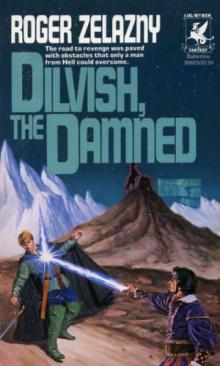 Dilvish, The Damned
Dilvish, The Damned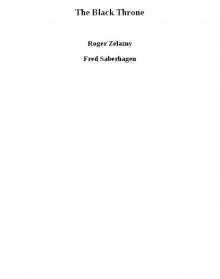 The Black Throne
The Black Throne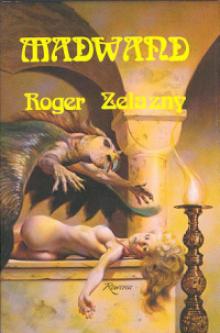 Wizard World 2: Madwand
Wizard World 2: Madwand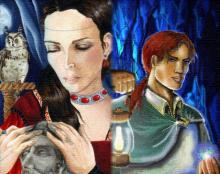 The Salesman's Tale
The Salesman's Tale